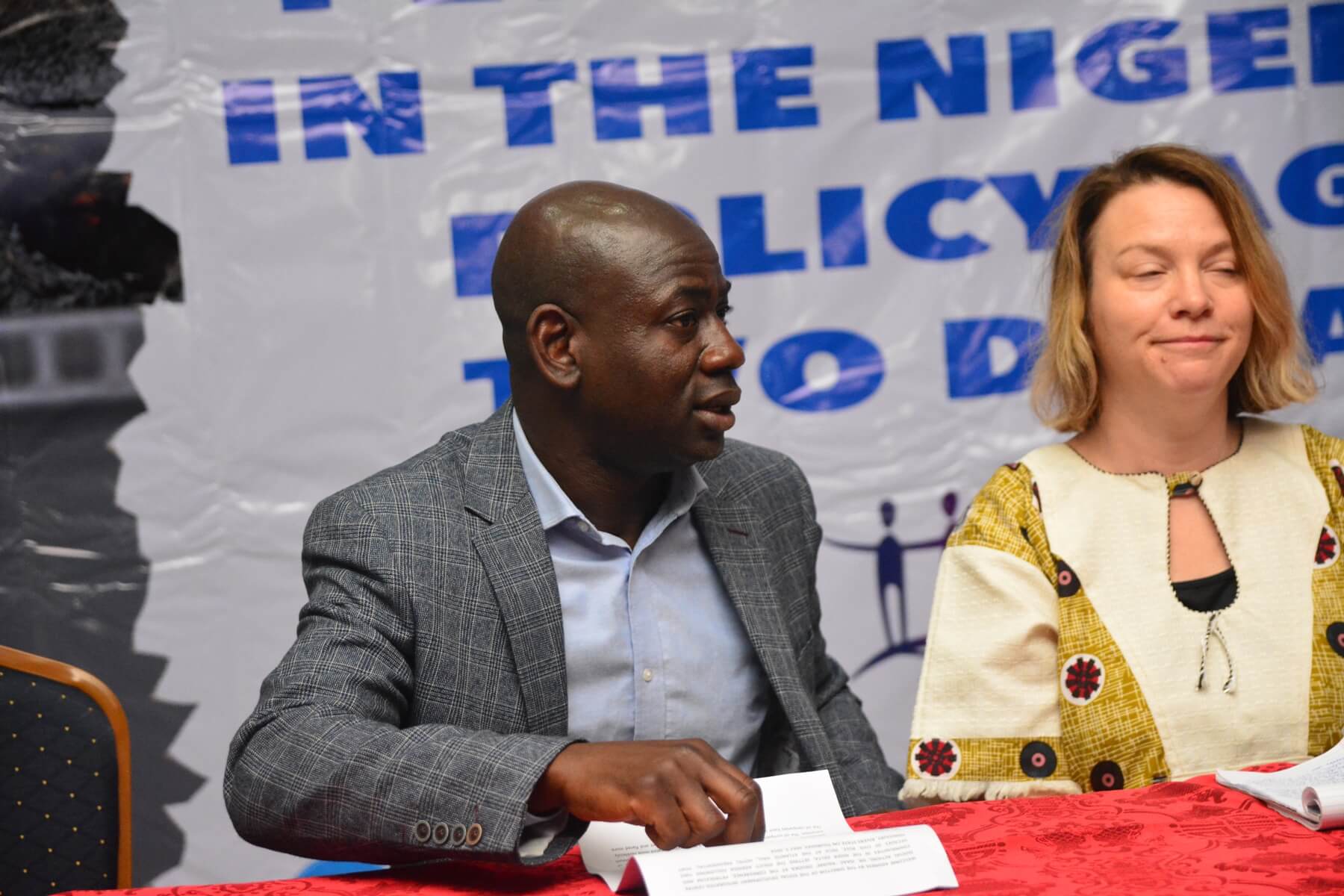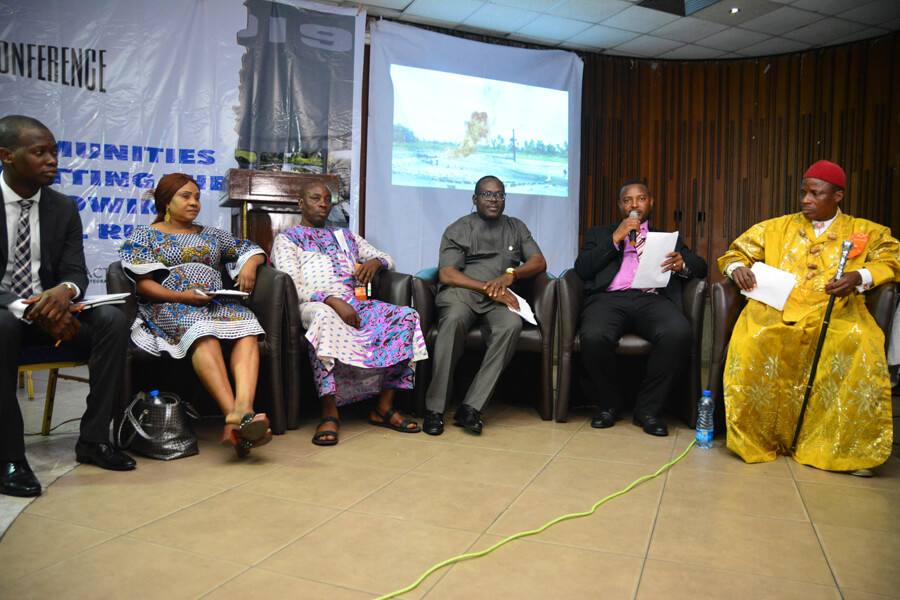Nigeria Resource Justice Conference focuses on petroleum and communities in the Niger Delta
After two decades of civil rule in Nigeria, over one thousand representatives of impacted communities, citizens groups, universities and national and sub-national agencies participated in the Nigeria Resource Justice Conference, which held in Port Harcourt, Rivers State on 2nd May 2019. Organised by the Social Action (Social Action), the Conference provided a platform for participants to examine the situation of communities in the sites of oil and gas production and to set policy agendas to tackle current challenges.
The environmental and human rights crises in the petroleum-bearing Niger Delta region of Nigeria was one of the main issues of concern for Nigerians and the international community when Nigeria was transiting from military dictatorship to civilian rule in 1999. Decades of impoverishment of the local people, destruction of their sources of livelihood, pollution of their environment through oil spillages and continuous gas flaring, joblessness and neglect of the community by the oil companies and government among others, worked as catalysts for conflict. Community members and other concerned groups expected robust changes in government and companies’ policies and practices to protect the environment, health, livelihoods and other human rights. However, in the twenty years of the Fourth Republic, the old problems persist despite some policy and legislative changes, and the creation of some new institutions such as the Niger Delta Development Commission (NDDC) in the year 2000 and Ministry of Niger Delta Affairs in 2008. The Presidential Amnesty Programme was also established in 2009 to deal with armed insurgency in the oil-producing areas. However, while the programme has succeeded in quelling ‘militancy’, the iniquities of petroleum extraction continue unabated.
Therefore, the Nigeria Resource Justice Conference, 2019 had the following objectives:
- To examine the current challenges to human rights, livelihoods and environmental sustainability in the sites of petroleum extraction in the Niger Delta basin and proffer solutions.
- To examine bills before the National Assembly with relevance to communities in the site of petroleum extraction and make recommendations.
- To examine workable options for litigation to achieve justice for victims of pollution and human rights abuses in the sites of petroleum extraction.
- Fortify links between community leaders, civil society groups, academics and elected representatives of the people.
- To examine roles elected representatives can play in advancing workable alternative legislative frameworks for the promotion of †he interests of the oil bearing communities
Participants from all over the Niger Delta included traditional rulers, youth and women organisations, faith based organisations, opinion leaders, civil society activists, media, academics and state institutions, etc. The Conference utilized plenary sessions, panel discussions, and provided opportunity for robust interaction among the participants.

The Director of Social Action, Dr. Isaac Asume Osuoka gave the welcome statement, while several invited guests gave goodwill messages to provide various insights and dimensions to the background issues of the struggle for natural resource and ecological justice in the Niger Delta region.

The conference reviewed the environmental, human rights, social, political, economic situations of the Niger Delta and unanimously agreed:
- That after twenty years of democratic rule, the hopes and aspirations of Niger Delta people that democracy will address the injustice and dehumanisation they suffered under military dictatorship has been dashed.
- That successive democratic governments since 1999 have failed to address the fundamental issues and demands of Niger Delta people as enunciated in the Ogoni Bill of Rights, Kaiama Declaration and several others.
- That oil and gas industry legislations before the National Assembly do not represent the wishes and aspirations of Niger Delta people but that of the government and the oil industry. Hence, the people of the Niger Delta will demand a people-oriented, environmentally sensitive and rights based legislations that address the wishes and aspirations of Niger Delta people.
- The conference particularly acknowledged the suffering, injustice, brutality and massive loss of lives orchestrated by the Nigerian army and the police force against Umuechem, Rumuekpe and several other communities in collusion with international oil companies for the protection of oilfields and pipeline installations
- That the Government of President Muhammadu Buhari has abandoned the Delta to be ravaged by heightened insecurity and economic hardship.
- That the Nigerian Government have failed to hold International Oil Companies to account for environmental degradation and human rights violations against the Niger Delta. But rather the International Oil Companies have variously divested their investments from onshore and community platforms in the Niger Delta to offshore locations where they will operate without accountability and proper regulation.
- The conference also encouraged communities in the Niger Delta whose human rights and environments have been violated by International Oil Companies to seek redress through litigation to reclaim their rights

Key Issues Identified: The following issues were raised by participants and deliberated upon
- Environmental pollution
- Leadership and governance gaps
- Gas flaring
- Human rights abuses
- Divide and rule system
- Oil theft and vandalism
- Conflict triggered by oil and gas extraction
- Militarization of the Niger Delta and security sector triggered violence
- Intimidation and military invasion of communities
- Youth restiveness, criminality and kidnapping
- Severe health hazards
- Destruction of lives and livelihoods
- Policy inconsistency
- Weak legal and institutional frameworks for gas utilization and commercialisation
- Funding gap to stop gas flaring
Recommendations and Way Forward: Moving forward, the following recommendations have been proffered
- Robust and proactive civil society engagement in collaboration with the media to support community struggles for ecological justice.
- Government should use the Military and Police Force to bring peace and security to the Niger Delta rather than intimidation and harassments.
- Civil society organisations should reinforce their actions and engagements to create opportunities for the voices of women and youths in the Niger Delta to be heard.
- That the Federal Government should redefine exiting policy frameworks and interventions in the Niger Delta region for effective implementation to achieve the desired goals.
- Oil companies should be more transparent and accountable in their dealings with their host communities.
- Community power should be built and supported to be better able to monitor the activities of oil multinationals.
- Government should be more proactive in regulating the activities of the oil companies, especially in reducing the level of environmental degradation and in promoting environmental justice.
- Local communities should be given the opportunity to participate in the oil and gas industry to give them a sense of belonging and ownership.
- Consistency in peaceful campaigns, advocacies and engagement with relevant institutions on the issues of environmental justice and adequate compensation for the communities.
- Government should implement programmes for environmental clean-up and remediation of all polluted areas in the Niger Delta region.
- Civil society organisations and communities should advocate for the improvement in the content of the various legislations before the National Assembly and facilitate for their passage.
- Legitimate demand for environmental justice from the government and oil companies.
- Intervention institutions such as the Niger Delta Development Commission should implement sustainable programmes and policies that addresses poverty, provision of health care, infrastructure and environmental sustainability.
- Oil companies should improve on their joint venture relationships with the government and corporate social responsibility strategies to communities to promote community development and build trust and validate the social license for their operations
- That communities and people of the Niger Delta should stop the blame game and come together to fashion ways to change the narrative of the Niger Delta for the common good.
